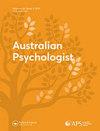The Wechsler Adult Intelligence Scale-Fourth Edition, Greek Adaptation (WAIS-IV GR): confirmatory factor analysis and specific reference group normative data for Greek Australian older adults
IF 2
4区 心理学
Q2 PSYCHOLOGY, MULTIDISCIPLINARY
引用次数: 3
Abstract
ABSTRACT Objectives In the absence of reliable and valid neuropsychological measures, accurate assessment of culturally diverse groups is a challenge facing the Australian neuropsychological community. This study aimed to investigate the construct validity and to develop specific reference group norms using the WAIS-IV Greek adaption (WAIS-IV GR) for Greek Australian older adults. Method A convenience sample of 90 healthy older Greek Australians (M = 77.14 ± 4.46; range = 70–85; 39 males & 51 females), with a primary school level of education (M = 5.60 ± 0.68; Range = 4–6) were recruited throughout the Melbourne metropolitan area. Results Regression modelling showed that age was the most significant predictor, therefore, subtest normative data were stratified according to three age bands. Normative data for all WAIS-IV GR subtests and indices were calculated, in addition to values for the 90% and 95% confidence levels. Confirmatory factor analysis indicated that a four-factor solution consisting of the WAIS-IV GR Index Scores displayed a superior fit with significant parameters of acceptable magnitude. Conclusion Findings support the application of the traditional WAIS-IV factor structure to a Greek Australian sample. Utilising specific reference group norms for Greek Australians with limited education will facilitate and improve access of cognitive assessment within this population. KEY POINTS What is already known on this topic:(1) The use of existing norms can lead to underestimating cognitive function in culturally diverse groups. (2) Access to culturally appropriate norms and tests for the assessment of culturally diverse groups in Australia is limited. (3) Neuropsychological test results are influenced by age, education, and culture. What this topic adds:(1) This is the first study to validate and provide WAIS-IV norms for a culturally diverse group in Australia. (2) Confirmatory factor analysis indicated that the internationally recognised WAIS-IV factor structure was appropriate for Greek Australian older adults. (3) Development of these resources will facilitate and improve access of cognitive assessment within this population.韦氏成人智力量表-第四版,希腊适应(WAIS-IV GR):验证性因素分析和特定参照组规范数据的希腊澳大利亚老年人
摘要目的在缺乏可靠有效的神经心理学测量方法的情况下,准确评估文化多样性群体是澳大利亚神经心理学界面临的挑战。本研究旨在调查结构的有效性,并使用WAIS-IV希腊语适应(WAIS-IV GR)为希腊-澳大利亚老年人开发特定的参考群体规范。方法对90名健康的希腊裔澳大利亚老年人(M = 77.14 ± 4.46;范围 = 70–85;39名男性和51名女性),具有小学教育水平(M = 5.60 ± 0.68;范围 = 4-6名)被招募到整个墨尔本大都市地区。结果回归模型显示年龄是最显著的预测因素,因此,亚测验标准数据按三个年龄段进行分层。除了90%和95%置信水平的值外,还计算了所有WAIS-IV GR子测验和指数的规范性数据。验证性因素分析表明,由WAIS-IV GR指数得分组成的四因素解决方案显示出与可接受大小的显著参数的优越拟合。结论研究结果支持将传统的WAIS-IV因子结构应用于希腊-澳大利亚样本。对受教育程度有限的希腊裔澳大利亚人使用特定的参考群体规范将促进和改善这一人群的认知评估。关键点关于这个话题的已知情况:(1)使用现有规范会导致低估文化多样性群体的认知功能。(2) 获得适合澳大利亚文化多样性群体的文化规范和测试的机会有限。(3) 神经心理测试结果受年龄、教育程度和文化的影响。本主题补充:(1)这是第一项为澳大利亚文化多样性群体验证和提供WAIS-IV规范的研究。(2) 验证性因素分析表明,国际公认的WAIS-IV因素结构适用于希腊-澳大利亚老年人。(3) 这些资源的开发将促进和改善这一人群的认知评估。
本文章由计算机程序翻译,如有差异,请以英文原文为准。
求助全文
约1分钟内获得全文
求助全文
来源期刊

Australian Psychologist
PSYCHOLOGY, MULTIDISCIPLINARY-
CiteScore
3.70
自引率
5.30%
发文量
32
期刊介绍:
The Australian Psychologist is the official applied practice and public policy journal of the Australian Psychological Society. As such, the journal solicits articles covering current issues in psychology, the science and practice of psychology, and psychology"s contribution to public policy, with particular emphasis on the Australian context. Periodically, Australian Psychological Society documents, including but not limited to, position papers, reports of the Society, ethics information, surveys of the membership, announcements, and selected award addresses may appear in the journal.
 求助内容:
求助内容: 应助结果提醒方式:
应助结果提醒方式:


